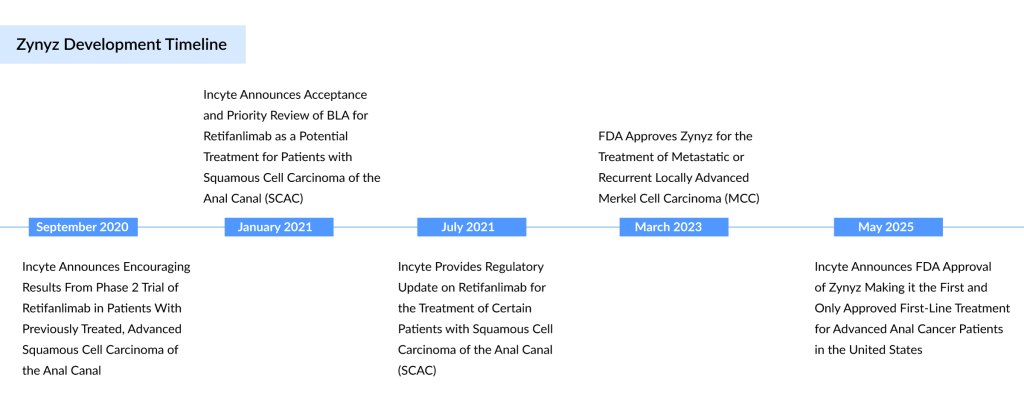Incyte’s Zynyz Secures Approval for Anal Cancer—A Comeback After FDA Rejection
May 23, 2025
Following two simultaneous FDA approvals, Incyte’s PD-1 inhibitor Zynyz has made a comeback in the treatment of anal cancer, four years after being initially rejected by the agency. On May 15, 2025, Incyte announced that the FDA approved Zynyz (retifanlimab-dlwr), a humanized monoclonal antibody that targets the PD-1, for use in combination with carboplatin and paclitaxel as a first-line treatment for adults with inoperable, locally recurrent, or metastatic squamous cell carcinoma of the anal canal (SCAC).
Additionally, Zynyz received approval as a standalone therapy for adults with locally recurrent or metastatic SCAC who have experienced disease progression on or cannot tolerate platinum-based chemotherapy.
Anal cancer is relatively rare, making up about 2.5% of all gastrointestinal tumors. However, its occurrence has been steadily rising over the last 30 to 40 years. This type of cancer is more commonly seen in women than in men and is most often diagnosed in individuals aged between 45 and 75 years. The most common form is anal squamous cell carcinoma (ASCC), which represents roughly 80–85% of anal canal cancers. Other less common types include adenocarcinomas, melanoma, and basal cell carcinoma.As per DelveInsight’s assessment in latest published Anal Cancer Epidem-based Market Report, in 2023, there were about 20,000 new cases of anal cancer across the seven major markets, with numbers expected to grow by 2034. In the United States that year, around 82% of anal cancer patients tested positive for HPV, highlighting HPV as the leading cause of the disease.
Downloads
Click Here To Get the Article in PDF
Zynyz was initially approved in 2023 for treating metastatic, recurrent, or locally advanced Merkel cell carcinoma and now plays a key role in Incyte’s oncology portfolio. Its supplemental Biologics License Application (sBLA) recently received Priority Review and subsequent FDA approval, supported by data from two clinical studies: the Phase III POD1UM-303/InterAACT2 trial and the Phase II POD1UM-202 trial.
“The FDA’s approval of Zynyz represents a significant milestone, introducing both combination and standalone treatment options for patients with advanced anal cancer after years of limited progress,” said Hervé Hoppenot, Chief Executive Officer of Incyte. “At Incyte, we concentrate on areas where we can create the greatest benefit for patients. I’m proud of our scientists and development teams for their dedication in bringing the first approved PD-1 inhibitor to US patients with SCAC.”

The Phase III POD1UM-303/InterAACT2 trial assessed Zynyz combined with platinum-based chemotherapy (carboplatin-paclitaxel) in adults with metastatic or inoperable, locally recurrent squamous cell anal carcinoma (SCAC) who had not previously received systemic chemotherapy. The Phase II POD1UM-202 study evaluated Zynyz as a standalone treatment in patients with locally advanced or metastatic SCAC that progressed after or were intolerant to platinum-based therapy.
Results from POD1UM-303/InterAACT2, presented at the 2024 ESMO Presidential Symposium on Practice-Changing Trials, showed a significant clinical benefit—a 37% reduction in the risk of disease progression or death (P=0.0006). Median progression-free survival was 9.3 months for the Zynyz-plus-chemotherapy group, compared to 7.4 months for the placebo group. Interim analysis also revealed a 6.2-month improvement in median overall survival (P=0.0273), with OS data still being collected. No unexpected safety concerns were noted, although 47% of patients experienced serious adverse events. The most common (≥2%) included sepsis (3.2%), pulmonary embolism (3.2%), diarrhea (2.6%), and vomiting (2.6%).
The approval of an intravenous PD-1 inhibitor, Zynyz monotherapy, was based on the POD1UM-202 study, where it showed an objective response rate (ORR) of 14% and a disease control rate of 49%. Its safety profile aligned with expectations for a PD-1 inhibitor and did not compromise HIV control in infected individuals. Serious adverse events occurred in 40% of treated patients, with the most frequent (≥2%) being infections not involving the urinary tract, perineal and abdominal pain, anemia, bleeding, diarrhea, fever, urinary tract infection, musculoskeletal pain, and breathing difficulties.
“Patients with inoperable, locally recurrent, or metastatic anal cancer have traditionally had limited treatment options and poor five-year survival outcomes,” said Dr. Marwan Fakih, Professor of Medical Oncology and Therapeutics Research and Co-Director of the Gastrointestinal Cancer Program at City of Hope. “The POD1UM study underscores the potential of Zynyz as a valuable new therapy, especially showing that combining Zynyz with platinum-based chemotherapy significantly extends progression-free survival. This approval represents a meaningful step forward in addressing a difficult-to-treat cancer.”
David Winterflood, CEO of the Anal Cancer Foundation, added, “People with anal cancer frequently encounter a lack of public awareness about the disease, including its risk factors and symptoms. The approval of Zynyz not only advances treatment options for advanced squamous cell anal carcinoma (SCAC) but also shines a light on a condition that has long been neglected, offering renewed hope for patients whose cancer has recurred or spread.”
In addition to filing a supplemental Biologics License Application (sBLA) in the US, Incyte has also submitted a Type II variation Marketing Authorization Application (MAA) to the European Medicines Agency (EMA) and a Japanese New Drug Application (J-NDA) to the Pharmaceuticals and Medical Devices Agency (PMDA) for retifanlimab in advanced SCAC. Both applications are currently under review.
Incyte remains dedicated to supporting patients and improving access to treatment. In the US, eligible patients prescribed Zynyz can benefit from IncyteCARES (Connecting to Access, Reimbursement, Education and Support), a robust support program that provides financial assistance, personalized guidance, educational materials, and other helpful resources.
The approval of Zynyz has intensified competition among pharmaceutical companies like Merck, BioMimetix, Novartis, and Bicara Therapeutics, prompting them to accelerate the development of their lead assets in a bid to capture market share and challenge Incyte’s position.
Merck is currently evaluating its blockbuster PD-1 inhibitor, KEYTRUDA, in phase II of development. Once approved, it will compete directly with Incyte’s Zynyz in the anal cancer therapeutic market. Zynyz (retifanlimab) may soon face competition not only from other PD-1 inhibitors but also from novel anal cancer therapies outside the PD-1 class. One promising contender is BioMimetix’s BMX-001, a redox-active metalloporphyrin (MnP) small molecule with potent anti-inflammatory properties.
BMX-001 operates via a dual mechanism of action that targets both cancerous and healthy tissues. In tumor cells specifically, it inhibits key pathways such as NF-κB and HIF-1α, which are involved in inflammation, angiogenesis, and tumor survival. By suppressing these pathways, BMX-001 promotes tumor cell death, limits the formation of new blood vessels, and helps reduce long-term tumor progression. Currently, the company is recruiting patients in its Phase I/II clinical trial of patients with newly diagnosed anal cancer.
Other anal cancer drugs include Novartis’ immunomodulatory agent KFA115 and Biocara Therapeutics’ EGFR / TGFβ-trap bifunctional antibody BCA101. Thus the pipeline for anal cancer looks promising, with a range of novel therapies and approaches under investigation that have the potential to redefine treatment standards and improve patient outcomes in the future.
The launch of these new therapies is expected to reshape the anal cancer treatment landscape, and it will be important to observe how Incyte adapts to maintain its market position following the recent approval of Zynyz.

Downloads
Article in PDF




